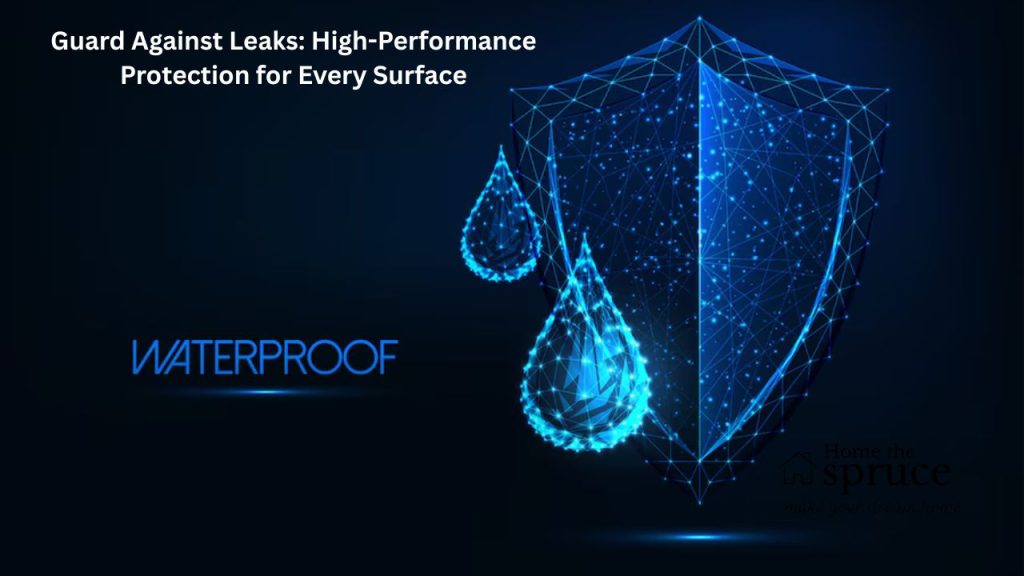Water damage is one of the most common and costly issues homeowners face, with even minor leaks potentially leading to structural problems, mould growth, and expensive repairs. Protecting vulnerable areas with the right materials is essential for maintaining a dry, healthy home environment. Among the most effective solutions, waterproof sealants provide invisible barriers that prevent moisture penetration while allowing surfaces to breathe, offering long-term protection without compromising aesthetics.

The Science Behind Waterproof Sealants
Modern waterproof sealants are engineered using advanced polymer technologies that create flexible, durable barriers against moisture. Unlike traditional sealants that can crack or degrade over time, premium formulations maintain their integrity through temperature fluctuations and structural movement. These products work by penetrating porous materials (like concrete or wood) or forming protective films on non-porous surfaces (such as metal or plastic), effectively blocking water while resisting mould, mildew, and UV damage. The best sealants are breathable, allowing trapped moisture to escape while preventing new water from entering – a crucial feature for exterior applications.
Key Applications for Maximum Protection
Different home areas require specific sealing approaches:
- Bathrooms & Wet Rooms: Seal grout lines, shower trays and around fixtures
- Kitchens: Protect backsplashes and worktop edges
- Exterior Walls: Defend against driving rain and groundwater
- Roofs & Gutters: Seal flashings and joints
- Basements: Create moisture barriers in below-ground spaces
Each application demands careful product selection – for instance, silicone-based sealants for bathrooms versus elastomeric coatings for exterior walls.
Choosing the Right Product
With countless options available, consider these factors:
- Substrate Compatibility: Different formulations for wood, concrete, tile etc.
- Flexibility: Critical for areas prone to movement (expansion joints, decking)
- VOC Content: Low-odour, eco-friendly options for indoor use
- Application Method: Brush-on, spray, or trowel-applied varieties
- Longevity: High-quality sealants last 10+ years versus 2-3 for basic products
Professional vs DIY Application
While many sealants are DIY-friendly, professional application ensures:
- Proper surface preparation (cleaning, priming, repairing cracks)
- Even coverage without missed spots
- Correct product selection for specific conditions
- Neat finishes, especially in visible areas
For large projects or critical waterproofing (like foundations), expert installation is always recommended.
Signs Your Sealants Need Attention
Watch for these warning signs:
- Visible cracks or peeling in existing sealant
- Discolouration or mould growth around sealed areas
- Musty odours indicating hidden moisture
- Efflorescence (white powder) on masonry surfaces
- Increased humidity levels indoors
Sustainable Waterproofing Solutions
Eco-conscious homeowners now have green alternatives:
- Plant-based silicone formulations
- Solvent-free acrylic sealants
- Recyclable packaging
- Products with low environmental toxicity
These perform comparably to conventional options while reducing environmental impact.
Innovations in Waterproofing Technology
Recent advancements include:
- “Smart” sealants that self-heal minor cracks
- Nanotechnology coatings for ultra-thin protection
- Colour-changing indicators showing when reapplication is needed
- Hybrid sealants combining multiple protective properties
Maintenance for Longevity
Extend your waterproofing system’s life with:
- Annual inspections of sealed areas
- Gentle cleaning with pH-neutral products
- Prompt repair of any damage
- Reapplication as per manufacturer guidelines
Cost vs Value Analysis
Quality waterproofing represents excellent value when considering:
- Prevention of costly structural repairs
- Reduced energy bills (damp homes require more heating)
- Health benefits from mould prevention
- Property value preservation
Conclusion
Effective waterproofing is an invisible yet essential element of home maintenance that pays dividends in protection and peace of mind. By understanding the different types of sealants available and their ideal applications, homeowners can make informed decisions to safeguard their properties against moisture damage. Whether tackling a small bathroom refresh or comprehensive exterior waterproofing, the right products applied correctly create durable barriers against leaks and damp. In an era of increasingly extreme weather patterns, investing in quality waterproofing solutions has never been more important – not just for building preservation, but for creating healthier, more comfortable living environments. Remember: when it comes to water protection, prevention is always far more cost-effective than cure.
